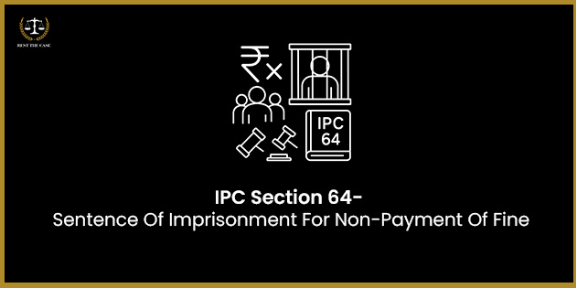IPC
IPC Section 64 - Sentence Of Imprisonment For Non-Payment Of Fine

In the Indian criminal justice system, punishment often includes fines, especially for petty offences or as an alternative to imprisonment. But what happens when someone refuses or fails to pay the fine? This is where Section 64 of the Indian Penal Code (IPC) becomes relevant. It provides courts with the authority to impose imprisonment in default of fine, ensuring that monetary penalties are enforceable and not simply ignored.
Though not as frequently discussed, Section 64 plays a critical role in strengthening the effectiveness of sentencing and maintaining respect for judicial orders.
What We Will Explore in This Blog
- The original meaning and legal explanation of IPC Section 64
- How default imprisonment works
- The difference between the main sentence and the default imprisonment
- Judicial safeguards under this section
- Practical examples and real-life implications
- Relevance in today’s legal system
What Is IPC Section 64?
Legal Text:
"In every case in which an offender is sentenced to a fine only, it shall be competent to the Court to direct that in default of payment of the fine, the offender shall suffer imprisonment for a term not exceeding one-fourth of the term of imprisonment which is the maximum fixed for the offence, and in any other case, the term of imprisonment shall not exceed one-fourth of the maximum term."
Simplified Explanation:
When a fine is imposed and the offender fails to pay it, the court can order that the person be imprisoned. However, the law limits this substitute imprisonment to a maximum of one-fourth of the highest jail term prescribed for that offence.
Purpose And Significance Of Section 64
The goal of this section is to ensure the fine is taken seriously and not treated as optional. Without such a provision, wealthier offenders could simply ignore fines without facing any real consequence.
Key Purposes:
- Legal enforceability of fines
- Preventing misuse or evasion of monetary penalties
- Reinforcing the authority of court-imposed sentences
Main Sentence vs Default Imprisonment
It is important to understand that default imprisonment is not the main punishment. It comes into effect only if the fine remains unpaid.
- The main sentence is the actual punishment for the offence (such as imprisonment for six months).
- The default sentence is additional and conditional. It only applies if the person fails to pay the fine.
For example, if a person is sentenced to pay a fine of Rs. 5000 with a default sentence of 2 months' imprisonment, they will only be jailed if they do not pay the fine.
Practical Application of Section 64
Suppose an offence carries a maximum punishment of one year in jail. A person is fined, but fails to pay. Under Section 64, the court can sentence them to default imprisonment for up to three months (one-fourth of one year).
This ensures the offender is held accountable, but the imprisonment is not disproportionate.
Judicial Observations on Section 64
Indian courts have clarified that default imprisonment is not a punishment for the crime itself, but a tool to ensure fines are paid. Courts have also noted that:
- The financial condition of the accused must be considered
- Imprisonment should not be ordered in a routine or harsh manner
- Poor convicts should not be unfairly punished due to their inability to pay
In the case of Shaikh Ayub v. State of Maharashtra, the court reduced the fine and default imprisonment imposed on a daily wage laborer, stressing that punishments must be fair and within the offender’s capacity.
Relevance in Modern Sentencing
Section 64 remains relevant because:
- It ensures fines are enforceable
- It prevents abuse of the system by those who might ignore court orders
- It serves as a balanced tool when fines are imposed for minor or compoundable offences
As India considers alternatives to short-term imprisonment, provisions like Section 64 offer a flexible yet effective mechanism to uphold sentencing.
Limitations and Safeguards
- The default term cannot exceed one-fourth of the maximum punishment for that offence
- The court must apply its mind to the offender’s financial situation
- Disadvantaged individuals may be given more time or alternative methods to pay
Conclusion
IPC Section 64 provides the legal framework for courts to impose imprisonment in default of fine, but with a clear upper limit. It ensures that monetary penalties are not disregarded, while also protecting the rights of individuals from excessive punishment. By linking financial penalties with a reasonable and proportionate default imprisonment, this provision reinforces judicial authority and promotes compliance. Courts are expected to exercise this power fairly, taking into account each offender’s unique circumstances.
Related Reading
Frequently Asked Questions
Q1. What does IPC Section 64 provide?
It allows the court to impose imprisonment if a fine is not paid, but limits the duration to one-fourth of the maximum imprisonment for the offence.
Q2. Is default imprisonment mandatory if a fine is not paid?
No, It is a discretionary power. Courts can choose to impose it or not, based on the case.
Q3. Does this imprisonment replace the original sentence?
No, it is additional and only applies if the fine is not paid.
Q4. Can default imprisonment be waived if the person is poor?
Yes, courts can waive or reduce fines or allow installment payments based on financial hardship.
Q5. Why is Section 64 important today?
It helps ensure fines are respected and enforced, especially when they are imposed instead of jail time for minor offences.






